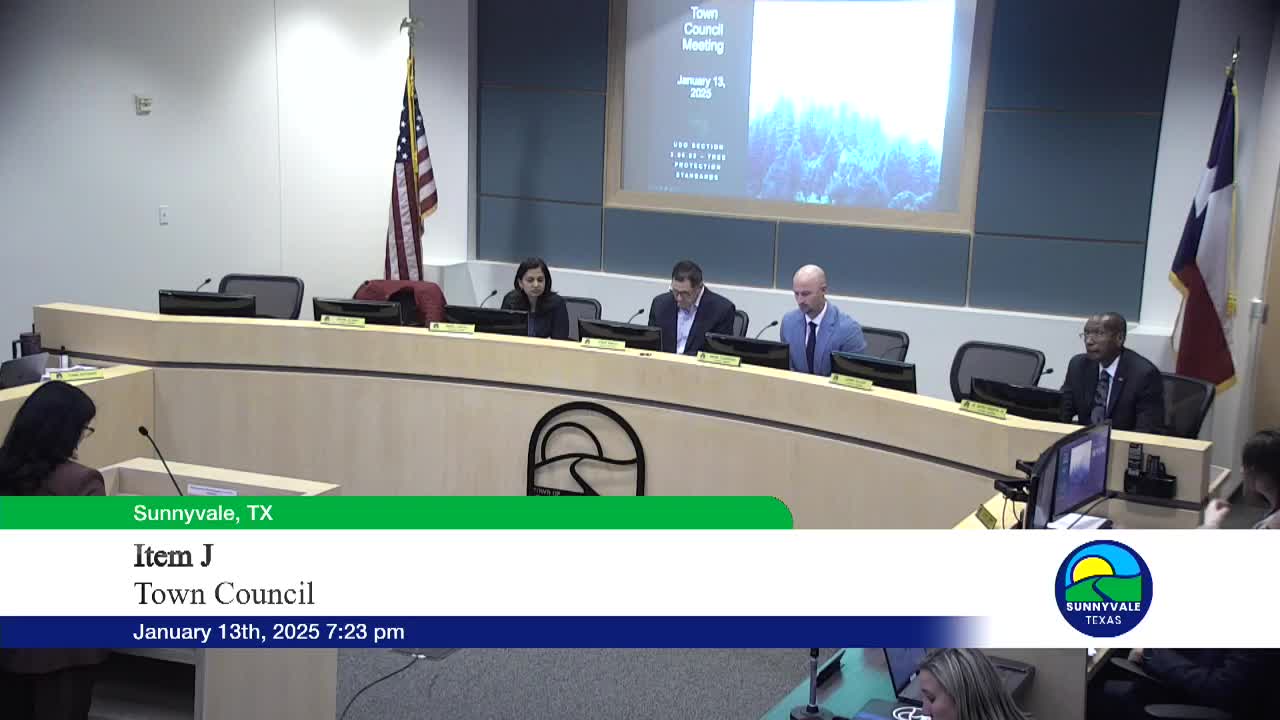Sunnyvale council adopts changes to tree-protection rules, narrows agricultural exemption
Get AI-powered insights, summaries, and transcripts
Subscribe
Summary
The Town Council unanimously approved amendments to Unified Development Ordinance section 3.0603 on Jan. 13 that tighten tree-removal procedures, expand the list of exempt species, add penalties for unauthorized removal and create a 60‑month mitigation clawback tied to future development.
Sunnyvale’s Town Council on Monday adopted amendments to the Unified Development Ordinance (UDO) that revise the town’s tree protection standards, narrow a blanket agricultural exemption and add new enforcement and mitigation provisions.
Development Services Director Shuru Bassen told the council the amendments respond to clear-cutting on agricultural parcels and aim to preserve mature tree canopy for shade, drainage and habitat benefits. The ordinance change adds procedures and documentation requirements for agricultural properties that claim the state exemption under the Texas Agricultural Code; staff said the amendments keep the town in compliance with state law while creating accountability when property owners remove trees and later seek development approvals.
Under the adopted language, property owners claiming agricultural operations must submit a tree survey or canopy delineation plan with a tree-removal permit application. If the property is developed within 60 months of that approved survey, protected trees removed earlier may be subject to mitigation calculated from the previously approved survey. Bassen said that 60‑month window was intended as a “clawback” to prevent exploiting the agricultural exemption to clear-cut before developing.
The amendment also expands the list of exempt trees by incorporating plants on the Texas Department of Agriculture’s noxious and invasive list; staff said the new list contains 34 taxa. The ordinance removes cedar trees from the exempt list that applied under the previous code. The amendment defines “protected tree” as any tree greater than three caliper inches that is not on the noxious/invasive list.
The ordinance increases the mitigation fee for trees that cannot be replaced on-site from $150 per caliper inch to $200 per caliper inch to match current market replacement costs. Staff also proposed a penalty for removing protected trees without a permit and clarified how preserved-tree credits may be applied toward landscaping requirements for new development; staff said the revisions make credits for retaining mature trees more generous than the previous schedule.
Bassen and staff clarified exemptions for existing single‑family homeowners: generally those lots are exempt unless a tree is designated for protection on an approved subdivision tree-protection plan, or unless state law already requires protection (the presentation referenced a state provision for trees larger than 10 caliper inches). The amended ordinance also explicitly ties replacement-tree irrigation and maintenance requirements to the UDO’s landscape standards (section 3.0602), and allows limited timing flexibility (staff said they typically grant a six‑month window to plant in the proper season).
Planning & Zoning recommended some adjustments at its Dec. 18 public hearing, including waiving fees for small agricultural operations and exempting small orchards; staff recommended retaining the $400 flat permit fee while exploring a future sliding fee in the townwide fee schedule. Council members asked staff about irrigation and enforcement and were told irrigation standards are included and staff will continue to use standard enforcement steps, with penalties available for persistent noncompliance.
Council member Eldridge moved to approve the amendment; the motion was seconded by Council member Woodrow and passed unanimously by members present.
The amendment updates UDO section 3.0603 and will be reflected in the town’s UDO code files. Staff said further fee-schedule changes and any sliding-fee option would be considered separately.
